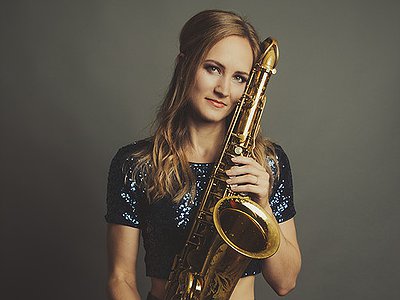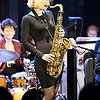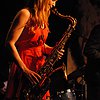What do improvisation and composition mean to you and what, to you, are their respective merits?
Improvisation is the act of creating in the moment. The merits of improvisation lie ultimately in that each time you create, you are saying something unique, that can never be replicated. You are having a conversation between yourself and any other musicians you may be playing with. You are expressing an emotion or story, an idea or dialogue - but you are free to explore it without limitations. There are guidelines - it’s not gibberish - but it’s not confined to any particular set of rules. You can create anything you want, and the possibilities are endless.
Improvisation requires a fluency in the language of the medium you improvise within. For Jazz, you must be fluent in the Jazz language to improvise at the highest level, but you can still converse even if you are just slightly familiar with the language. It comes down to a difference of depth in the expression. But the beauty is that every person will improvise differently, and the expression will always be unique.
Improvisation within Jazz is democratic - all the musicians influence each other, every person has a role, and each different set of musicians will interact differently. Improvisation has the potential to offer something that only happens within spontaneity - that moment, when surprise and the “divine inspiration” come together, and you play something you can never replicate.
Composition is the act of creating, revising, editing, and coming up with a work that maintains. Composition shows its beauty in providing a framework for a listener that holds familiarity. There is more of a structure of what a composition is designed to do. It is the foundation, holding together the different parts, and allowing the improvisation to come to life within its constructs. Composition has the ability to stay with someone - a melody that you can’t get out of your head. You can manipulate it to become exactly what you want, premeditated. It provides a context for the improvisation, so it has the potential to hold more power.
Both Improvisation and Composition are ways to express one’s unique artistic voice. They are just two different mediums of expressing it.
How do you see the relationship between sound, space and performance and what are some of your strategies and approaches of working with them?
If we’re talking about physical space, I always feel different performing in each new space or venue. It is something you have to take into consideration, because the sound will most definitely feel different in each space. The acoustics and shape of the room, and any sound system or lack thereof. This naturally effects the performance, and there is a bit of an internal struggle to make it feel “normal” so you can feel comfortable, and not let the space get in your way of your voice. But these differences in space and sound also make it possible for each performance to have its own unique feel and direction.
Derek Bailey defined improvising as the search for material which is endlessly transformable. Regardless of whether or not you agree with his perspective, what kind of materials have turned to be particularly transformable and stimulating for you?
It’s always the search for the unknown. As soon as some material or another is familiar, or assimilated fully into the consciousness, I become bored with it. So, the infinite process of searching, finding, learning, knowing, and then discarding is something I have become accustomed to. My interests are fluid, so sometimes I may be searching for one type of sound or material, and other times another. My focus is changeable as well - so I may have certain elements in the forefront of my priorities of what I want to be hearing and playing that at another time is not as important to me.
Purportedly, John Stevens of the Spontaneous Music Ensemble had two basic rules to playing in his ensemble: (1) If you can't hear another musician, you're playing too loud, and (2) if the music you're producing doesn't regularly relate to what you're hearing others create, why be in the group. What's your perspective on this statement and how, more generally, does playing in a group compare to a solo situation?
I certainly agree that if you can’t hear another musician you’re playing with, there is a problem in the balance of the group, and most likely you need to be more sensitive to what is going on around you. The whole point of music in an ensemble setting is that the musicians are working together, to make something greater than they could create by themselves. Especially when you are improvising, you must be able to respond to each other, so you can create a dialogue. That is what Jazz is all about, at least. Otherwise, you might as well play by yourself.
Playing in a group is easier than playing solo in some regards - in a group, you don’t have to outline every element. Your responsibility is more narrow in certain regards. As a soloist, you can add on top to whatever foundation is underneath you; or as an accompanist, you can provide a minimal backdrop and not feel the need to shape the entire piece. In a group, there is a social contract you should stick to, just like real life. So, in other ways it’s easier to play solo, because you are not responsible to anyone else. You can be more flexible with things, or drive the entire piece without worrying about catching anyone else up, so to say.
With more and more musicians creating than ever and more, what does this mean for you as an artist in terms of originality? What are some of the areas where you currently see the greatest potential for originality and who are some of the artists and communities that you find inspiring in this regard?
The most beautiful and exciting thing about music is that it is infinite. There are an unlimited number of possibilities of what you can create. Every single person would play something slightly differently, compose something slightly differently. As humans, we are conduits for the music, we are the instrument. Through us, the music can come to life. We are only playing a part in allowing ideas to come to fruition. So, the deeper we get into different types of music, the more possibilities open up for creation. Any artist can only be him or herself. So in that way we don’t have a choice in originality if we are honest with ourselves. I am always drawn to these artists that are the most honest artists. The ones who get rid of their own ego, to make room for the ideas to flow from them naturally and uninhibited. Within any genre or community, you will only find a select few of these artists.





